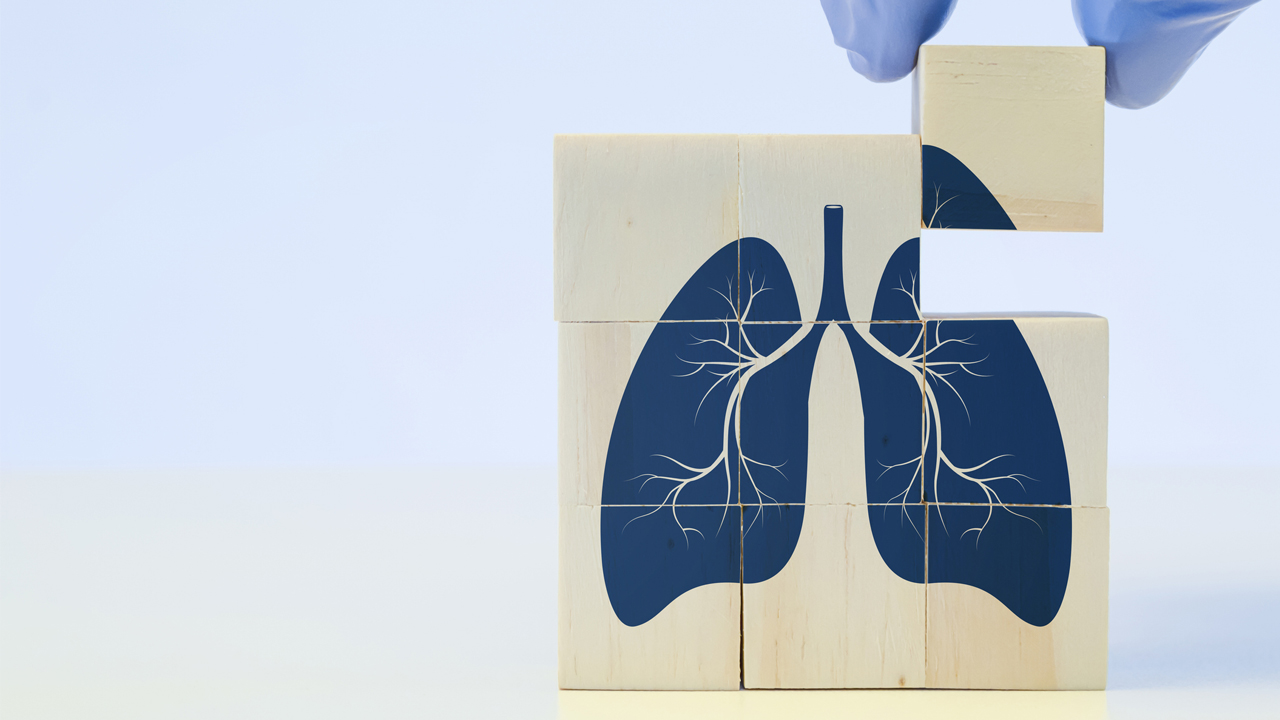In Clinical
Follow this topic
Bookmark
Record learning outcomes
Each winter, hospitals struggle to manage a tsunami of respiratory disease: it is as inevitable as shops full of overpriced Christmas tat.
“Lung conditions, the leading driver of winter pressures within our NHS, are responsible for one in eight emergency admissions in England – higher than heart disease, musculoskeletal conditions and cancer,” says Sarah Sleet, chair of the Taskforce for Lung Health and chief executive of the charity Asthma + Lung UK.
“Last winter saw many parts of the NHS once again overwhelmed as the rise in flu admissions led to exceptionally high demand for emergency hospital services,” adds Alastair Buxton, director of NHS Services at Community Pharmacy England. “Something needs to be done.”
People with respiratory disease often experience sub-optimal care in the community. “We have known for years that community pharmacy is ideally placed to deliver smoking cessation, vaccinations and annual respiratory reviews, which are crucial to lung health. But despite strong evidence, delivery has been inconsistent and underfunded,” Sleet says.
“Preventative measures and patient education in primary care are key to achieving well-controlled respiratory disease and stopping patients from presenting to secondary care,” agrees Millie Harris, lead respiratory pharmacist at Worcestershire Acute Hospitals.
“This may include seasonal immunisations, smoking cessation support, and prophylactic antibiotics and rescue packs for COPD. Poor inhaler adherence and technique continue to be big challenges, leading to poorly controlled disease.”
Buxton believes now is an opportune moment to address these issues. “There’s no better time to harness community pharmacy’s full potential,” he says.
“The Government considers reform of the health service to be one of its core priorities and wants to shift healthcare from hospitals to the community. The 10 Year Health Plan envisages a growing role for community pharmacies in managing long-term conditions and vaccine delivery but is light on detail. We now have a real opportunity to shape these proposals in line with our own recommendations around lung health.”
Action plan
Community Pharmacy England and the Taskforce for Lung Health – a coalition of more than 50 groups including patients, clinicians, health professional organisations and charities – have therefore developed an action plan to prevent future winter respiratory health crises.
“We are launching the joint action plan now because we have a real window of opportunity,” says Sleet. “The publication of the 10 Year Health Plan signals a clear shift towards prevention, earlier intervention and care closer to home.
"Our action plan is about turning years of potential into practical progress – increasing the role of pharmacy in supporting lung health, improving respiratory outcomes and relieving pressure on hospitals. But it is also a call to protect and invest in pharmacy now so that it can continue to serve the millions of people with respiratory conditions who rely on it every day.
“We believe respiratory services in community pharmacy must be at the heart of the new plan for the NHS. Community pharmacies have an essential role to play in improving outcomes for respiratory patients and preventing another NHS winter crisis. For many people with respiratory conditions, pharmacies are their most regular and accessible contact with the healthcare system.”
The action plan covers vaccination, smoking cessation and annual asthma reviews. According to Buxton: “These three areas make good use of pharmacists’ clinical expertise and are the best examples of ‘quick wins’, requiring minimal effort from policymakers to enable but also providing significant benefits for patients.”
Sleet points out that commissioning a wider range of NHS vaccinations – such as respiratory syncytial virus (RSV), pneumococcal and childhood flu – through community pharmacy builds on an already successful service model.
“The Taskforce welcomes NHS England’s announcement that up to 200 community pharmacies will be commissioned to provide the RSV vaccine in 2025/2026 for older adults and pregnant women,” she says.
“As uptake of the RSV vaccine remains a concern, especially among underserved and vaccine-hesitant cohorts, we encourage the NHS to continue to expand the number of pharmacies included in this vaccination programme.”
This winter some community pharmacies will take part in a one-season trial of a new flu vaccination advanced service for children aged two to three years.
Broadening eligibility for NHS smoking cessation services would also allow pharmacies to support many more people. Asthma + Lung UK wants the Government to introduce a levy on the tobacco industry, which could raise around £700m a year.
“This levy should be ringfenced to fund smoking cessation services, including a national pharmacy smoking cessation service that people can access without a referral,” Sleet argues.
“This would be a crucial step towards reducing the huge burden caused by smoking-related respiratory diseases.”

Patients should be encouraged to return inhalers for disposal.
A wish list for the next 10 years
“By 2035, we hope that respiratory services in community pharmacies are trusted and widely used, helping to transform lung health, and that pharmacists play a key role in supporting self-management by providing annual reviews with inhaler checks,” says Sarah Sleet, chair of the Taskforce for Lung Health and chief executive of the charity Asthma + Lung UK.
“We also see pharmacists at the forefront of the Government’s shift towards prevention. By 2035, pharmacies should be delivering smoking cessation support as part of a fully funded national service and helping to create a smoke-free generation.
“Additionally, the Government should ensure that respiratory patients can easily access vaccines. In the next decade, these preventative services must be integrated into everyday pharmacy interactions with patients and funded as core parts of respiratory care delivery.”
Improving asthma reviews
“Community pharmacies could do more to support the management of asthma and COPD by providing inhaler technique checks and annual reviews,” Buxton says.
“This would help improve lung health in the community and reduce pressure on GP services, as well as providing patients with more choice about accessing advice and support.”
Asthma + Lung UK’s 2025 Life with a Lung Condition survey found that only 54 per cent of people with asthma receive a yearly inhaler check. “This is concerning,” says Sleet.
“Annual inhaler checks are critical to managing asthma as they allow patients to optimise their technique. With the right support, pharmacies could carry out annual reviews, including inhaler checks, helping to prevent asthma attacks and reduce emergency admissions.”
Harris believes community pharmacists are ideally positioned to detect patients with poorly controlled disease. “For example,” she says, “pharmacists should refer people with a high frequency of inhaled short-acting beta-2 agonist collection to their GP or respiratory specialist nurse.
This also applies to COPD patients with high rescue antibiotic usage, which supports antimicrobial stewardship in the community.
“Patients with asthma and COPD are eligible for the New Medicine Service, which should support patient engagement with their new inhaled therapy. In addition, to reduce the carbon footprint, healthcare professionals should advise patients to return empty inhalers to their community pharmacy for safe disposal.”
The last few years have witnessed a revolution in asthma and COPD treatments, such as monoclonal antibodies targeting pro-inflammatory mediators.
“There is a large cohort of severe asthma patients eligible for biologic therapy who are currently unknown to secondary care,” Harris says.
“Detecting these patients at their primary care asthma reviews and prompt referral is crucial to ensure they receive the treatment they need.”
The Community Pharmacy Independent Prescribing Pathfinder Programme is clarifying the scope of practice for pharmacist prescribers. “A respiratory clinic commissioned by NHS England is currently being piloted in Manchester,” Harris says.
“Interventions include identifying short-acting beta-2 agonist overuse, completion of personalised asthma action plans and supporting prescribing of maintenance and reliever therapy for asthma in line with new national guidance.
“The pharmacy involved has access to the Greater Manchester Care Record to inform prescribing decisions. The clinic reduces patient waiting times, relieves pressure on GP surgeries and better utilises pharmacists’ expert medication knowledge and prescribing capabilities. Patient feedback has been positive.”
Aspiration to implementation
“Several areas need to be addressed to turn our recommendations into reality,” Alastair Buxton says. “Policymakers need to work with us to agree specifications backed with appropriate funding so that services are sustainable. We are ready and willing to discuss with ministers and officials how this can be taken forward.”
He stresses that workload pressures could hinder implementation. “That is why it is so important to get the funding right, enabling pharmacy owners to put resources in place,” he says.
“There is also more work Government can do to help support pharmacies in other areas of their work, such as medicines supply, so they can devote more time to using their clinical skills. Integrating community pharmacies into wider healthcare pathways and joining up IT systems would greatly help to streamline patient care. We were particularly pleased to see such a commitment made by the Government in its 10 Year Plan.”
Harris believes that communication between primary and secondary care is vital if professionals delivering respiratory care are to fully appreciate the roles and needs of their colleagues.
“In secondary care,” she says, “respiratory specialist pharmacists should ensure communication documents are clear and provide any specialist advice for medication follow-up or monitoring.
“All sectors face significant operational pressures; this must be considered when requesting actions of primary and community pharmacy care. The creation of up-to-date guidance for use across an integrated care system requires input from specialists in primary and secondary care to ensure local practice is consistent.”
Against this background, employing greater numbers of respiratory specialist pharmacists (RSPs) could improve management across both primary and secondary care.
“The National Respiratory Audit Programme Organisational Audit report 2024 highlighted that RSP staffing levels are well below the recommended levels outlined by the British Thoracic Society,” says Harris.
“To better support those with respiratory disease, reduce hospital admissions and ease costs, the NHS Long Term Plan committed to ensuring patients ‘receive and use the right medication’, which is difficult to achieve without sufficient RSPs.”
But what about pharmacy closures?
Arresting the seemingly inexorable decline in pharmacy numbers is also critical. During 2024, four pharmacies closed every week in England. “Pharmacy closures are accelerating, particularly in areas of high need,” Sleet warns.
Between 2015 and 2023, 37.5 per cent of pharmacy closures occurred in the most deprived 20 per cent of neighbourhoods in England. “Of the major conditions, lung diseases are the most strongly linked with deprivation,” says Sleet.
“Pharmacy closures will disproportionately affect people with respiratory conditions. We are concerned that this will exacerbate the disproportionate contribution that lung diseases make to the health inequality gap and make it impossible for the Government to meet its pledge to halve the gap in life expectancy between the richest and poorest regions in England.”
“Pharmacists could offer so much more, whether that is providing targeted health checks, advice and support to stop smoking, or being a one-stop shop for minor health conditions like coughs, colds and hay fever,” says Buxton.
“We are keen to start discussions with the Government to ensure that these proposals will be implemented in a way that works best for our sector, underpinned by appropriate funding and seeking to avoid adding any unnecessary workload.”
“The Government must make better use of pharmacies to support lung health,” Sleet adds. “Without urgent action, the number of respiratory emergency admissions will continue to rise, and it will be impossible to prevent future NHS winter crises.”

